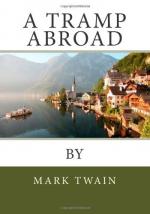Harris said that if the best writer in the world once got the slovenly habit of doubling up his “haves” he could never get rid of it while he lived. That is to say, if a man gets the habit of saying “I should have liked to have known more about it” instead of saying simply and sensibly, “I should have liked to know more about it,” that man’s disease is incurable. Harris said that his sort of lapse is to be found in every copy of every newspaper that has ever been printed in English, and in almost all of our books. He said he had observed it in Kirkham’s grammar and in Macaulay. Harris believed that milk-teeth are commoner in men’s mouths than those “doubled-up haves.” [1]
1. I do not know that there have not been moments
in the
course of the present session
when I should have been
very glad to have accepted
the proposal of my noble friend,
and to have exchanged parts
in some of our evenings
of work.—[From
a Speech of the English Chancellor
of the Exchequer, August,
1879.]
That changed the subject to dentistry. I said I believed the average man dreaded tooth-pulling more than amputation, and that he would yell quicker under the former operation than he would under the latter. The philosopher Harris said that the average man would not yell in either case if he had an audience. Then he continued:
“When our brigade first went into camp on the Potomac, we used to be brought up standing, occasionally, by an ear-splitting howl of anguish. That meant that a soldier was getting a tooth pulled in a tent. But the surgeons soon changed that; they instituted open-air dentistry. There never was a howl afterward—that is, from the man who was having the tooth pulled. At the daily dental hour there would always be about five hundred soldiers gathered together in the neighborhood of that dental chair waiting to see the performance—and help; and the moment the surgeon took a grip on the candidate’s tooth and began to lift, every one of those five hundred rascals would clap his hand to his jaw and begin to hop around on one leg and howl with all the lungs he had! It was enough to raise your hair to hear that variegated and enormous unanimous caterwaul burst out! With so big and so derisive an audience as that, a suffer wouldn’t emit a sound though you pulled his head off. The surgeons said that pretty often a patient was compelled to laugh, in the midst of his pangs, but that had never caught one crying out, after the open-air exhibition was instituted.”
Dental surgeons suggested doctors, doctors suggested death, death suggested skeletons—and so, by a logical process the conversation melted out of one of these subjects and into the next, until the topic of skeletons raised up Nicodemus Dodge out of the deep grave in my memory where he had lain buried and forgotten for twenty-five years. When I was a boy in a printing-office in Missouri, a loose-jointed,




